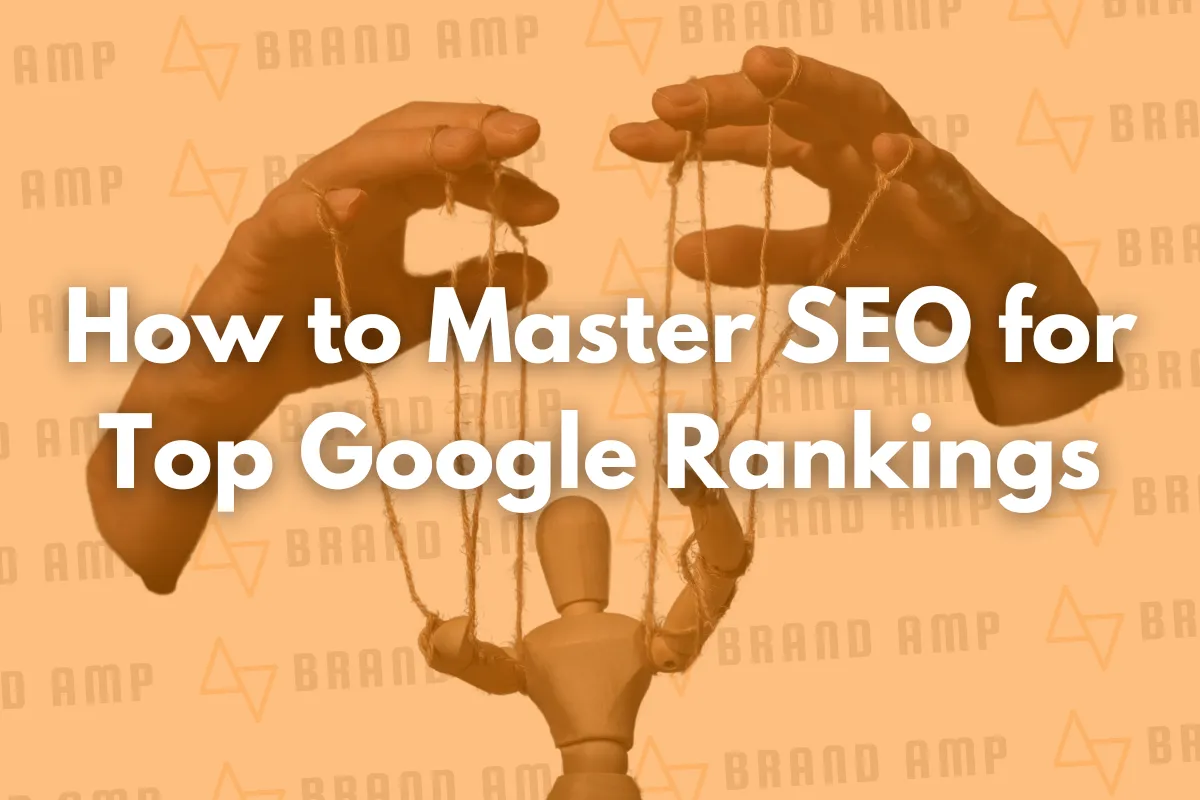
2024 CASE STUDY
How we grew a national tool brand's orders by 39% Year over Year with an 11x return on ad spend...
3 Pillars we Use to Get Targeted Traffic That Converts Into Sales
How to Run a Customer Locator Campaign
Indoctrinating your Invisible Audience and Standing Out
Nudging and Converting with Laser-Focused Retargeting
2024 CASE STUDY:
How we grew a national tool brand's orders by 39% Year over Year with an 11x return on ad spend...
3 Pillars we Use to Get Targeted Traffic That Converts Into Sales
How to Run a Customer Locator Campaign
Indoctrinating your Invisible Audience and Standing Out
Nudging and Converting with Laser-Focused Retargeting
Our Blog

How to Master SEO for Top Google Rankings
In today's digital landscape, achieving a top ranking on Google is paramount for businesses looking to enhance their online visibility and drive organic traffic to their websites. With millions of websites vying for attention, mastering Search Engine Optimization (SEO) is essential to secure a coveted spot on the first page of Google search results. In this comprehensive guide, we delve into the intricacies of SEO to equip you with the knowledge and strategies needed to outrank the competition and claim the number one position on Google.
Understanding the Fundamentals of SEO
SEO is the practice of optimizing your website to increase its visibility and relevance in search engine results. It encompasses a wide range of techniques and strategies aimed at improving your website's rankings for targeted keywords. Key components of effective SEO include:
Keyword Research
Keyword research forms the foundation of any successful SEO strategy. By identifying the terms and phrases your target audience is using to search for products or services, you can tailor your content to match their intent. Utilize tools like Google Keyword Planner, SEMrush, or Ahrefs to uncover high-volume keywords with low competition.
On-Page Optimization
On-page optimization involves optimizing various elements on your website to improve its search engine rankings. This includes optimizing meta tags, headers, and content for target keywords, as well as ensuring your website is mobile-friendly and has fast loading times. Additionally, incorporating relevant multimedia elements such as images and videos can enhance user engagement and dwell time, signaling to search engines that your content is valuable.
Technical SEO
Technical SEO focuses on optimizing the technical aspects of your website to improve its crawlability, indexability, and overall performance. This includes optimizing site structure, implementing schema markup, fixing broken links, and ensuring proper URL structure. Conduct regular audits using tools like Google Search Console and Screaming Frog to identify and address any technical issues that may impact your site's visibility.
Crafting High-Quality Content
Content is king in the world of SEO, and producing high-quality, relevant content is essential for attracting and engaging your target audience. Follow these best practices to create content that resonates with both users and search engines:
Create Comprehensive, In-Depth Content
Long-form content tends to perform better in search engine rankings, as it provides more value and addresses users' queries in greater detail. Aim to create comprehensive, in-depth articles that thoroughly cover a topic, utilizing research, statistics, and expert insights to enhance credibility and authority.
Optimize Content for User Intent
Understanding user intent is crucial for creating content that meets the needs of your audience. Conduct thorough keyword research to identify the search intent behind target keywords, whether it's informational, navigational, or transactional. Tailor your content to match the intent behind the user's query, providing valuable information or solutions to their problems.
Incorporate Visual Elements
Visual elements such as images, infographics, and videos can enhance the appeal and readability of your content, as well as improve user engagement. Use relevant visuals to complement your written content, breaking up large blocks of text and making it easier for users to digest information. Additionally, optimize image alt tags and filenames with target keywords to improve visibility in image search results.
Building High-Quality Backlinks
Backlinks are a critical ranking factor in Google's algorithm, serving as a vote of confidence from other websites. Focus on acquiring high-quality backlinks from authoritative websites within your industry to boost your site's credibility and authority. Implement the following strategies to build quality backlinks:
Guest Blogging
Guest blogging on reputable websites within your niche is an effective way to earn valuable backlinks and establish thought leadership in your industry. Identify relevant websites that accept guest contributions and pitch well-researched, informative articles that provide value to their audience.
Influencer Outreach
Collaborating with influencers and industry experts can help you amplify your content reach and attract quality backlinks. Reach out to influencers in your niche and offer to provide them with valuable content or resources in exchange for a backlink to your website.
Content Promotion
Promoting your content through social media, email marketing, and online communities can help increase its visibility and attract organic backlinks. Encourage readers to share your content with their networks, and actively engage with industry influencers and communities to foster relationships and earn backlinks organically.
Monitoring Performance and Adjusting Strategies
Continuous monitoring and optimization are essential for maintaining and improving your website's search engine rankings over time. Utilize analytics tools such as Google Analytics and Google Search Console to track key metrics, including organic traffic, keyword rankings, and backlink profile. Analyze performance data regularly to identify areas for improvement and adjust your SEO strategies accordingly.
In conclusion, mastering SEO requires a comprehensive understanding of its fundamental principles and the implementation of effective strategies to optimize your website for search engine visibility. By focusing on keyword research, on-page optimization, high-quality content creation, and link building, you can improve your website's rankings and outrank the competition on Google. Remember to monitor performance continuously and adapt your strategies to stay ahead in the ever-evolving world of SEO.
Want to boost your SEO rankings and drive more relevant organic traffic to your website? Book a call with Brand Amp now!

